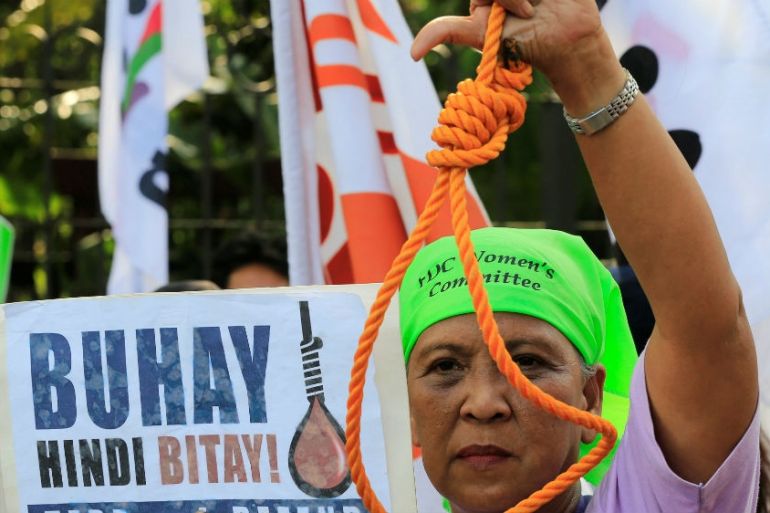Drug offence executions more than halve in 2018 after Iran reform
Report warns that populist governments advocating use of death penalty may undermine global progress towards abolition.

Kuala Lumpur, Malaysia – Human rights experts have hailed a sharp drop in executions for drug offences in 2018, even as they expressed worries over a large number of people worldwide still facing the death penalty for non-violent drug crimes.
In a new report on Tuesday, Harm Reduction International (HRI) said it documented 91 executions for drug crimes last year, compared with 288 in 2017 – a 68 percent drop largely driven by fewer deaths in Iran following drug law reforms.
Keep reading
list of 4 itemsPalestinian Prisoner’s Day: How many are still in Israeli detention?
‘Mama we’re dying’: Only able to hear her kids in Gaza in their final days
Europe pledges to boost aid to Sudan on unwelcome war anniversary
It is the first time the number of executions – which excludes China and Vietnam – has fallen below 100 since the London-based NGO started compiling figures in 2007.
But the annual report warned that at least 7,000 people across the world are on death row for drug offences and that populist governments advocating the use of capital punishment as a key plank of drug control policy could undermine global progress towards abolition.
“The fall in executions is undeniably positive but far too many people are still sentenced to death row for low-level drug offences where they suffer serious human rights violations,” said Giada Girelli, the report’s author and HRI’s human rights analyst.
“There is simply no evidence that the death penalty serves as a deterrent and this inhumane practice must be abolished immediately.”
The annual report said four countries carried out the death penalty for drug offences last year – Saudi Arabia, Iran, Singapore and China.
HRI said Saudi Arabia was responsible for the highest number of such executions, sending at least 59 people to their deaths. Iran followed with 23 people, followed by Singapore, where nine people were executed.
China continued to use capital punishment in relation to drug crimes, and HRI was able to confirm a number of specific occasions when people had been executed for drug offences.
The report did not provide a specific figure because the number of confirmed executions is likely to be an underestimate in a country where death penalty statistics are a state secret. China is also not included in the headline figure for global executions for the same reason. Nor is Vietnam where executions are also shrouded in secrecy.
![Students training in the Drug and Poison Division at the King Fahad Security College look at a collection of bottles of alcohol confiscated by Saudi security forces in the past [File: Fahad Shadeed/Reuters]](/wp-content/uploads/2019/02/55821fe819d94c7fadfd774dd22b39cc_18.jpeg)
Legislative reform
Executions in Iran dropped by 50 percent last year following amendments to drug legislation that increased the minimum amounts of drugs for death penalty offences. The change meant executions were put on hold while cases were reviewed.
In a posthumous report issued in March 2018, Asma Jahangir, the United Nations special rapporteur on human rights in Iran, said that 5,300 people were on death row or serving a life term in Iranian prisons for drug offences and could see their sentence commuted as a result of the new law.
However, the report noted that a mandatory death sentence remained in force for a number of drug-related crimes.
In Malaysia, the government announced last year a moratorium on executions and said it would abolish the death penalty for all crimes, after earlier amending legislation that put those caught with even the smallest amounts of illicit substances facing the mandatory death penalty.
Ministers acknowledged that capital punishment had not succeeded in reducing drug use or trafficking, while the punitive policy meant more than 50 percent of inmates in the country’s prisons were being held for drug offences.
No deterrent
Professor Adeeba Kamarulzaman, dean of medicine at the University of Malaya in Malaysia, said the world had reached a “tipping point” on the use of the death penalty in relation to drugs amid growing recognition that capital punishment was an ineffective deterrent.
Nevertheless, Malaysia’s announcement triggered upset among those who support capital punishment and the necessary legislation has still to be introduced in parliament.
Adeeba said policymakers needed to better articulate their case.
They “have to try and change the narrative”, she told Al Jazeera. “There is a combination of health and social issues that put people at risk. Getting people to understand that is important. In some ways, those of us in the medical world have abrogated our responsibilities to the justice system.”
Despite evidence that capital punishment is no deterrent to drugs, HRI noted that last year some countries appeared to be looking to the death penalty as a key component of drug policy.
|
|
All the executions carried out in 2018 in Singapore were for drug offences, while Bangladesh expanded the application of the death penalty to more substances and Sri Lanka said it would end a 43-year moratorium on the death penalty by executing those convicted of drug trafficking.
Meanwhile, legislation backed by the Philippines President Rodrigo Duterte to impose the death penalty for drug crimes as part of his continuing “war” on drugs has been passed by the lower house, but has not secured Senate approval.
HRI’s Girelli said continued progress to eliminate the death penalty, which remains a punishment for drugs in 35 countries and territories around the world, would depend on political will and public education.
“When it comes to public opinion, there’s a lack of information around the death penalty for drugs and the death penalty in general,” she told Al Jazeera.
“If people were to learn about all the due process violations associated with the death penalty and if they knew the situation of people convicted to death for drugs then they would not believe in it.”